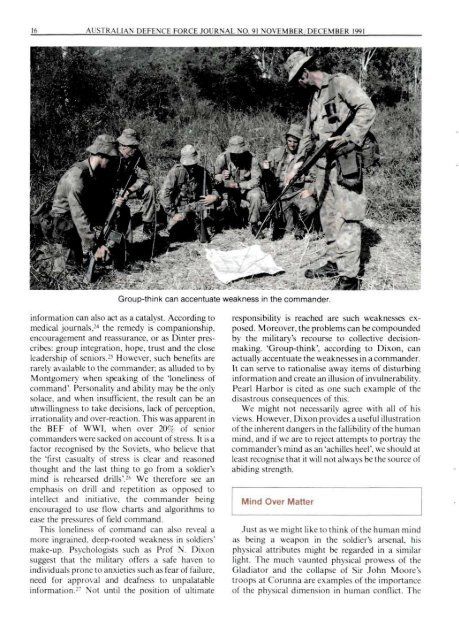ISSUE 91 : Nov/Dec - 1991 - Australian Defence Force Journal
ISSUE 91 : Nov/Dec - 1991 - Australian Defence Force Journal
ISSUE 91 : Nov/Dec - 1991 - Australian Defence Force Journal
You also want an ePaper? Increase the reach of your titles
YUMPU automatically turns print PDFs into web optimized ePapers that Google loves.
16 AUSTRALIAN DEFENCE FORCE JOURNAL NO. <strong>91</strong> NOVEMBER DECEMBER 19<strong>91</strong><br />
Group-think can accentuate weakness in the commander.<br />
information can also act as a catalyst. According to<br />
medical journals, 24 the remedy is companionship,<br />
encouragement and reassurance, or as Dinter prescribes:<br />
group integration, hope, trust and the close<br />
leadership of seniors. 25 However, such benefits are<br />
rarely available to the commander; as alluded to by<br />
Montgomery when speaking of the 'loneliness of<br />
command'. Personality and ability may be the only<br />
solace, and when insufficient, the result can be an<br />
unwillingness to take decisions, lack of perception,<br />
irrationality and over-reaction. This was apparent in<br />
the BEF of WWI, when over 20% of senior<br />
commanders were sacked on account of stress. It is a<br />
factor recognised by the Soviets, who believe that<br />
the 'first casualty of stress is clear and reasoned<br />
thought and the last thing to go from a soldier's<br />
mind is rehearsed drills'. 2 '' We therefore see an<br />
emphasis on drill and repetition as opposed to<br />
intellect and initiative, the commander being<br />
encouraged to use flow charts and algorithms to<br />
ease the pressures of field command.<br />
This loneliness of command can also reveal a<br />
more ingrained, deep-rooted weakness in soldiers'<br />
make-up. Psychologists such as Prof N. Dixon<br />
suggest that the military offers a safe haven to<br />
individuals prone to anxieties such as fear of failure,<br />
need for approval and deafness to unpalatable<br />
information. 2 " Not until the position of ultimate<br />
responsibility is reached are such weaknesses exposed.<br />
Moreover, the problems can be compounded<br />
by the military's recourse to collective decisionmaking.<br />
'Group-think', according to Dixon, can<br />
actually accentuate the weaknesses in a commander.<br />
It can serve to rationalise away items of disturbing<br />
information and create an illusion of invulnerability.<br />
Pearl Harbor is cited as one such example of the<br />
disastrous consequences of this.<br />
We might not necessarily agree with all of his<br />
views. However, Dixon provides a useful illustration<br />
of the inherent dangers in the fallibility of the human<br />
mind, and if we are to reject attempts to portray the<br />
commander's mind as an 'achilles heel', we should at<br />
least recognise that it will not always be the source of<br />
abiding strength.<br />
Mind Over Matter<br />
Just as we might like to think of the human mind<br />
as being a weapon in the soldier's arsenal, his<br />
physical attributes might be regarded in a similar<br />
light. The much vaunted physical prowess of the<br />
Gladiator and the collapse of Sir John Moore's<br />
troops at Corunna are examples of the importance<br />
of the physical dimension in human conflict. The

















